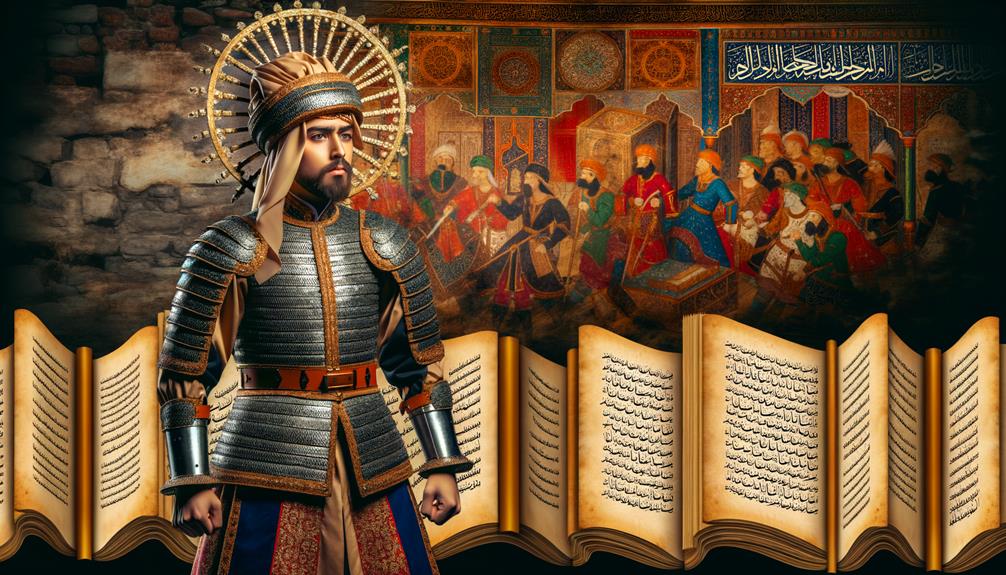Taimur Name Meaning in English
The name 'Taimur' has its roots in ancient Turkic-Mongolic languages and translates to 'iron,' embodying notions of strength and resilience. First made prominent by the 14th-century conqueror Timur, also known as Tamerlane, Taimur signifies military prowess and leadership.
Historically revered in Persian, Central Asian, and South Asian contexts, the name has adapted and endured over centuries, sustaining its relevance across diverse cultures. Modern usage spans regions from South Asia to North America, demonstrating its timeless appeal.
Spelling variations like Timur and Temur highlight linguistic nuances. Understanding Taimur's symbolism reveals much about cultural and historical shifts it embodies.

Key Takeaways
- The name 'Taimur' means 'iron,' symbolizing strength and resilience.
- It originates from Turkic and Mongolic languages.
- Taimur is associated with the 14th-century conqueror Timur.
- The name signifies leadership and military prowess.
- It remains popular across South Asia, Central Asia, and increasingly in North America.
Historical Origins
The historical origins of the name 'Taimur' can be traced back to the 14th century, deriving from the Persian and Turkic languages where it was prominently borne by the conqueror Timur, also known as Tamerlane.
Emerging in Central Asia, Timur's influence extended over vast territories, leaving a significant imprint on history. His name, associated with formidable military prowess and expansive empire-building, has endured through centuries.
This historical figure's legacy has rendered the name 'Taimur' synonymous with strength and leadership. The socio-political impact of Timur's reign further cemented the name in various cultures, transcending regional boundaries.
In this manner, the historical roots of 'Taimur' are deeply intertwined with themes of power, conquest, and enduring legacy.
Etymology of Taimur
The etymology of the name Taimur reveals its deep historical roots, originating from the Turkic-Mongolic languages where it signifies 'iron,' symbolizing strength and resilience.
This name's cultural significance is further highlighted by its association with the famous conqueror Tamerlane, whose legacy has influenced its perception across various regions.
Analyzing the linguistic evolution of Taimur provides insights into how its pronunciation and meaning have adapted over centuries, reflecting broader socio-cultural shifts.
Historical Roots of Taimur
Originating from Persian and Turkic languages, the name Taimur has deep historical roots that trace back to the legendary conqueror Timur, also known as Tamerlane.
This name, derived from the Turkic word 'temür,' meaning 'iron,' symbolizes strength and resilience. Timur, the 14th-century ruler, established a vast empire across Central Asia, reflecting the might and strategic prowess associated with the name.
His legacy, marked by military triumphs and cultural patronage, has cemented Taimur as a name of historical significance. The etymological journey from 'temür' to Taimur illustrates a linguistic evolution influenced by Persian and Turkic interactions, hence encapsulating a rich heritage that endures in contemporary usage.
Cultural Significance Explained
Building on its historical roots, the cultural significance of the name Taimur is equally profound, reflecting a blend of linguistic traditions and symbolic meanings that have persisted through centuries.
Originating from Persian and Turkic elements, Taimur translates to 'iron' or 'strong,' symbolizing resilience and fortitude. Historically associated with the 14th-century conqueror Timur, also known as Tamerlane, the name evokes images of strength and leadership. Its resonance extends into modern times, often chosen for its connotations of power and endurance.
Additionally, Taimur has been embraced by various cultures, highlighting its adaptability and cultural integration. This rich tapestry of meanings underscores the name's enduring relevance in diverse sociocultural contexts.
Linguistic Evolution Insights
Tracing back to its etymological roots, the name Taimur derives from a synthesis of Persian and Turkic languages, embodying the meanings of 'iron' and 'strong.'
The Turkic element 'temür' or 'temir' translates directly to 'iron,' symbolizing durability and resilience. In Persian, the name retains these robust connotations, further enriched by historical usage.
Significantly, the name Taimur gained prominence through Timur, the 14th-century conqueror, often referred to as Tamerlane. His legacy contributed to the linguistic evolution and widespread adoption of the name across various cultures.
The amalgamation of these linguistic elements underscores a shared cultural appreciation for strength and fortitude, making Taimur a name that resonates with historical and cultural depth.
Cultural Significance
The name Taimur, deeply entrenched in various cultures, frequently carries significant historical and symbolic meanings that transcend regional boundaries. Originating from Mongol and Turkish roots, Taimur often symbolizes strength and leadership, reflecting the legacy of the 14th-century conqueror Timur, also known as Tamerlane. His impact on Eurasian history has imbued the name with connotations of power and resilience.
In Persian and Central Asian contexts, Taimur is revered, symbolizing a formidable figure in cultural memory. Additionally, in modern South Asia, the name retains its historical prestige while also symbolizing a connection to a rich, multifaceted heritage. This blend of historical weight and cultural reverence underscores Taimur's enduring significance across diverse societies.
Taimur in Literature
Frequently depicted as a central figure in literary works, Taimur's storied legacy often serves as a rich source of inspiration for authors exploring themes of conquest, leadership, and resilience.
His life has been meticulously chronicled in both historical texts and fictional narratives, offering a multifaceted portrayal of his complex character. In classical Persian literature, Taimur is often idealized as a paragon of strategic genius and indomitable will.
Western writers have similarly embraced his persona, weaving tales that highlight his military prowess and administrative acumen. These literary portrayals not only underscore Taimur's historical significance but also invite readers to grapple with the ethical dimensions of his rule, making his figure an enduring subject of academic and popular discourse.
Modern-Day Usage
While Taimur's historical and literary legacy continues to captivate scholars and readers alike, his name has also found a place in modern contexts, reflecting its enduring resonance across cultures and generations. The name Taimur is increasingly popular in various regions, demonstrating its adaptability and timeless appeal. Below is a table illustrating the modern-day usage of the name Taimur:
| Region | Usage |
|---|---|
| South Asia | Commonly used for boys |
| Middle East | Popular and carries historical significance |
| Europe | Recognized but less common |
| North America | Gaining popularity in diverse communities |
| Central Asia | Continues to be a traditional choice |
This modern utilization underscores Taimur's cross-cultural and intergenerational significance.
Famous Namesakes
Renowned figures throughout history and in contemporary times have borne the name Taimur, contributing to its lasting prominence and cultural significance.
The most notable historical figure is Timur, also known as Tamerlane, a 14th-century Turco-Mongol conqueror whose empire extended across Central Asia and beyond. His military prowess and administrative acumen solidified his legacy.
In modern contexts, the name Taimur gained renewed attention through Taimur Ali Khan, the son of Bollywood celebrities Saif Ali Khan and Kareena Kapoor. His high-profile birth and media coverage have made the name popular among contemporary audiences.
These namesakes underscore the name's enduring appeal, bridging historical grandeur with modern-day cultural relevance, thereby ensuring its continuous resonance across generations.
Symbolism and Traits
The name Taimur, steeped in historical and cultural significance, symbolizes strength, leadership, and resilience, qualities attributed to its notable bearers. This name carries profound implications, reflecting a legacy of formidable leaders and warriors who have left an indelible mark on history.
Key traits associated with the name Taimur include:
- Strength: Denotes physical and mental fortitude, often seen in those who overcome significant challenges.
- Leadership: Implies the capability to guide and inspire others, a trait seen in historical figures bearing this name.
- Resilience: Represents the ability to recover from adversity, a quality evident in Taimur's storied past.
- Strategic Thinking: Indicates a propensity for careful planning and tactical prowess, essential for achieving success.
Name Variations
Exploring the various name variations of Taimur reveals the rich cultural tapestry and linguistic adaptations that have shaped its global presence.
The name Taimur, often spelled as Timur, Temur, or Teymur, finds its roots in Turkic and Mongolic languages, reflecting its historical prominence.
In Persian, it is rendered as تیمور, while in Arabic, it appears as تيمور.
The variations not only signify phonetic differences but also embody diverse cultural nuances.
For instance, Timur is closely associated with the famed 14th-century conqueror Timur the Lame, known in the west as Tamerlane.
These variations underscore the name's adaptability and enduring legacy across different regions and time periods, illustrating its profound historical and cultural resonance.
Conclusion
To wrap up, the name Taimur, steeped in rich historical origins and etymological depth, has traversed various cultures and epochs, leaving an indelible mark on literature and modern naming conventions.
Its symbolic resonance and associated traits continue to captivate, reflecting a tapestry of valor and strength.
As with many names of profound heritage, Taimur has stood the test of time, proving that historical and cultural significance can be the thread that weaves through the fabric of identity and legacy.






